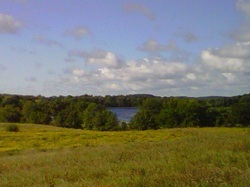Examples of holy isolation also abound in the literature on Native Americans. Most know of these as the vision quest. Among the Plains Indians, it was common for a young man to go to a remote area and cover himself completely, then to lie there for 3 or so days without food or water, until his spirit master "took pity" on him and revealed itself. It must be recalled that this was standard practice, not isolated to a few chosen for such spiritual endeavors. The acolytes did indeed suffer and often, if not always, did meet their guiding spirits. No lasting psychosis have been mentioned to my knowledge.
It would be difficult to exhaust the examples we have of people who were subjected to isolation, both intentionally and accidentally, but I believe the results of such isolation - including those small times many spend in silent meditation - are fairly limited. For one, even among those of a scientific bent, there are challenging times. Recall Lilly's "alone with one's God, one has no alibis." With this, there are differences in the types of isolation: for complete but temporary isolation, such as in the isolation tanks, there seems little trouble, except, I would imagine, to those with particular phobias or emotional problems. There, we find that the mind is NOT dependent on outside stimulation, and seems in fact to have an independent existence of its own - beyond, as the author of Proof of Heaven wrote, the physical brain itself. There we find infinite variation, both defined by our own cultural and personal experiences (the Indian finds an animal spirit protector, for one), and completely apart from it - the "communication from a civilization far beyond our own," as Lilly put it, as well as the universally recognized "Satori," that is, the realization of the Godhead or Absolute, or that which is ALL and beyond words.
For the longer-term isolation, the affects seem dependent on what Timothy Leary labeled "set" and "setting," the former being one's view on life, the latter being the surrounding environment. Of the two, the former seems to have the greatest affect. Pilgrims, whether as part of a religious tradition or not, seem to fair the best: they have set out for a challenge and to learn, and find both. They are often frightened and shaken to their roots, but that is what they set out to do - to blot out or cover the old to let in Truth. Monks giving lessons on this do warn the acolytes that there have been those who have gone in the wrong direction with this, at the very least. But it is worse for those who have become accidental isolates, and who have no intention of contacting a greater power or identity. The man in Antarctica, the Basque shepherd, the prospectors in Australia - it seems they came away from the experience with unfinished business. It seems, to me, that they had no predilection towards either the Absolute or to investigate the other odd spaces that are available to the mind. I think what happened to them is that their world view was crushed by forces they had no intention of ever pursuing, and no concept of what they were. They were befuddled but could not accept an expanded view of reality. Some perhaps never did, and so remained in silent shell-shock, while others most likely lived the experience off, coming across that weird space of eternity only on dark, terrifying nights of bad dreams.
For two - for those who don't break, there IS an expansion of mind. Again, the affects, whether good or ill, are probably modified by expectations. For instance, the animal spirit of the Indians might appear as a saint or angel to a monk, but the meaning and power of the image would be the same. And to those who expect such things, awe might be aroused, but probably not the sort of long-lasting fear that those without such concepts of an otherworld experience. And there are always the challenges - for the Indian, perhaps tests of courage, for the monk, perhaps a test of will against evil. For us, we suffer most from psychological and social distress - from perceived inadequacies and Freudian hang-ups to social blunders, both coming forward when the normal chatter of the mind is reduced. That is our "devil" I believe, and our hardship to overcome in ordinary self-imposed temporary isolation.
I have to end - that is, for now, even as other questions arise, especially one concerning the limits of the mind as opposed to the Absolute experience - but I must end with this: with long-term isolation, I cannot be certain as to how I would react. While I might think that I have a firm enough conviction of the Absolute to avoid mental derangement, I will never really know until I am put into such a condition. As the Hindus say, "not this, not that." That is, we cannot know it until we experience it. And we might not experience "it", for ultimately, that depends on something that the religious call grace (what scientists might call the right mind set - of which we cannot be sure until the moment arrives). I might, as others have, get lost in fear or in some psychological ox bow. With short-term isolation, I am more sure - it seems that in this we have time to incorporate the experience without a total break. It seems to me that it - meditation, silence, temporary isolation - would be worth the while for most, without exceptional danger. It is, I believe, the only way to "it" if one has the inclination.
Then there are those who are called to true enlightened, in which a total break must come eventually. But in that case, it is absolute faith that gets them through to the Absolute, and allows them to stay there. But of these, there are few. FK

 RSS Feed
RSS Feed